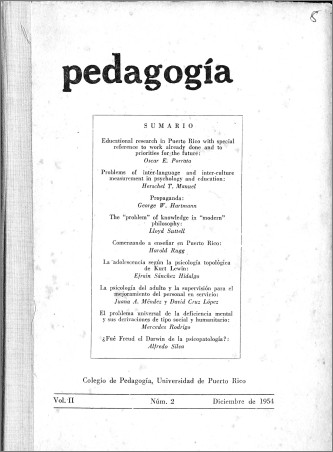Abstract
How to cite:
Suttell, L. (1954). The "problem" of knowledge in "modern" philosophy. Pedagogía, 2(2), 63-71. Retrieved from https://revistas.upr.edu/index.php/educacion/article/view/16584
References
Frederick J. E. Woodbridge, An Essay on Nature (New York: Columbia University Press, 1940), p. 11.
Immanuel Kant, Critique of Pure Reason in Theodore Meyer Greene, ed., Kant: Selections (New York: Charles Scribner's Sons, 1929), p. 29.
Isaac Newton. Principles, Book III, "Fourth Rule of Reasoning in Philosophy."
John Dewey, A Common Faith (New Haven : Yale University Press, 1934), p. 26.
John Dewey, "Common Sense and Science: their Respective Frames of Reference," ]ournal of Philosophy, Vol. XLV, No. 8, April 8, 1948, p. 203.
John Dewey, Experience and Nature (Chicago : Open Court Publishing Company, 1925), p. 21.
John Dewey, Quest for Certainty (New York: Minton, Balch and Company, 1929), p. 200.
John Dewey, The Public and its Problems (London: George Allen and Unwin, Ltd., 1927), pp. 176-177.
John Herman Randall, Jr., The Making of the Modern Mind, revised edition (Cambridge, Massachusetts: Houghton Mifflin Company, 1940), p. 267.
John Locke, Essay concerning Human Understanding in Sterling P. Lamprecht, ed., Locke: Selections (New York: Charles Scribner's Sons, 1928 ), pp. 111, 112.
Rene Descartes, Rules for the Direction of the Mind in Ralph M. Eaton, ed., Descartes: Selections (New York: Charles Scribners Sons, 1927) , p. 44.
The contents published in the Puerto Rico Journal of Education is freely distributed under open access practices, in accordance with the Creative Commons license, Attribution-NonCommercial 4.0 International (CC BY-NC 4.0). Through these principles, the journal and its authors allow readers to access, reproduce and share articles in full text. Users should give credit to authors in a reasonable way without suggesting they have their support. Under no circumstances, readers may make use of the contents for commercial purposes. The authors retain copyright on their works.

